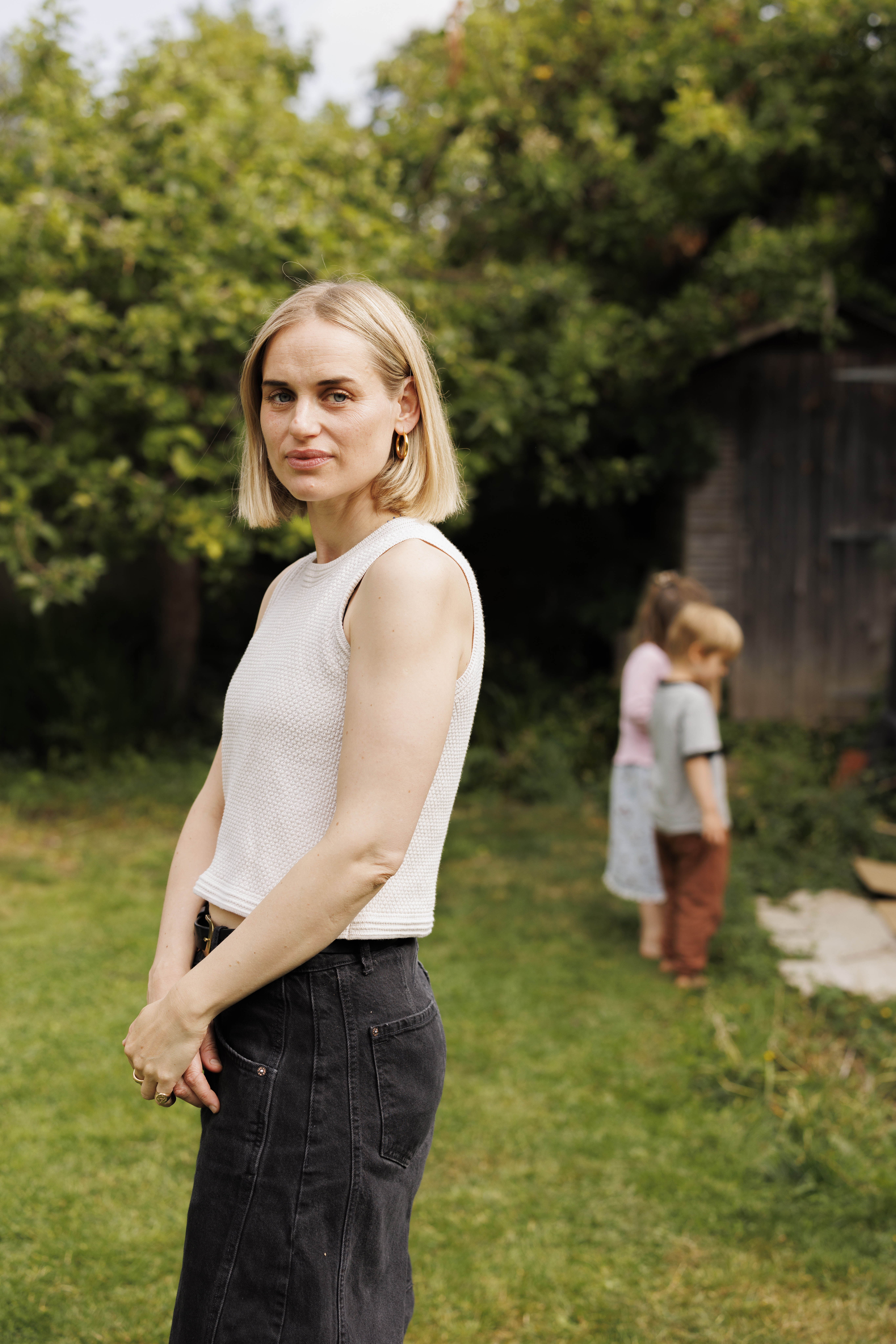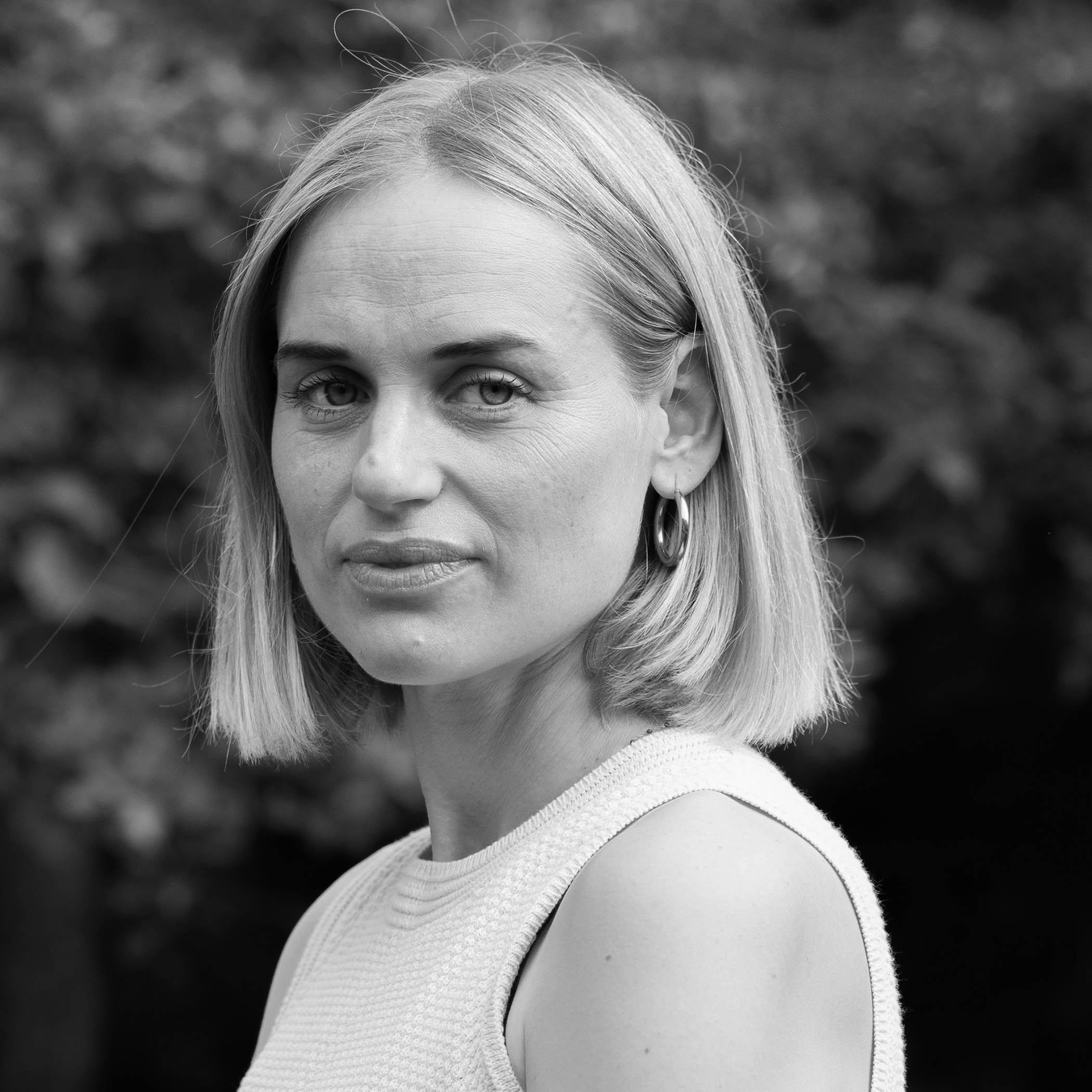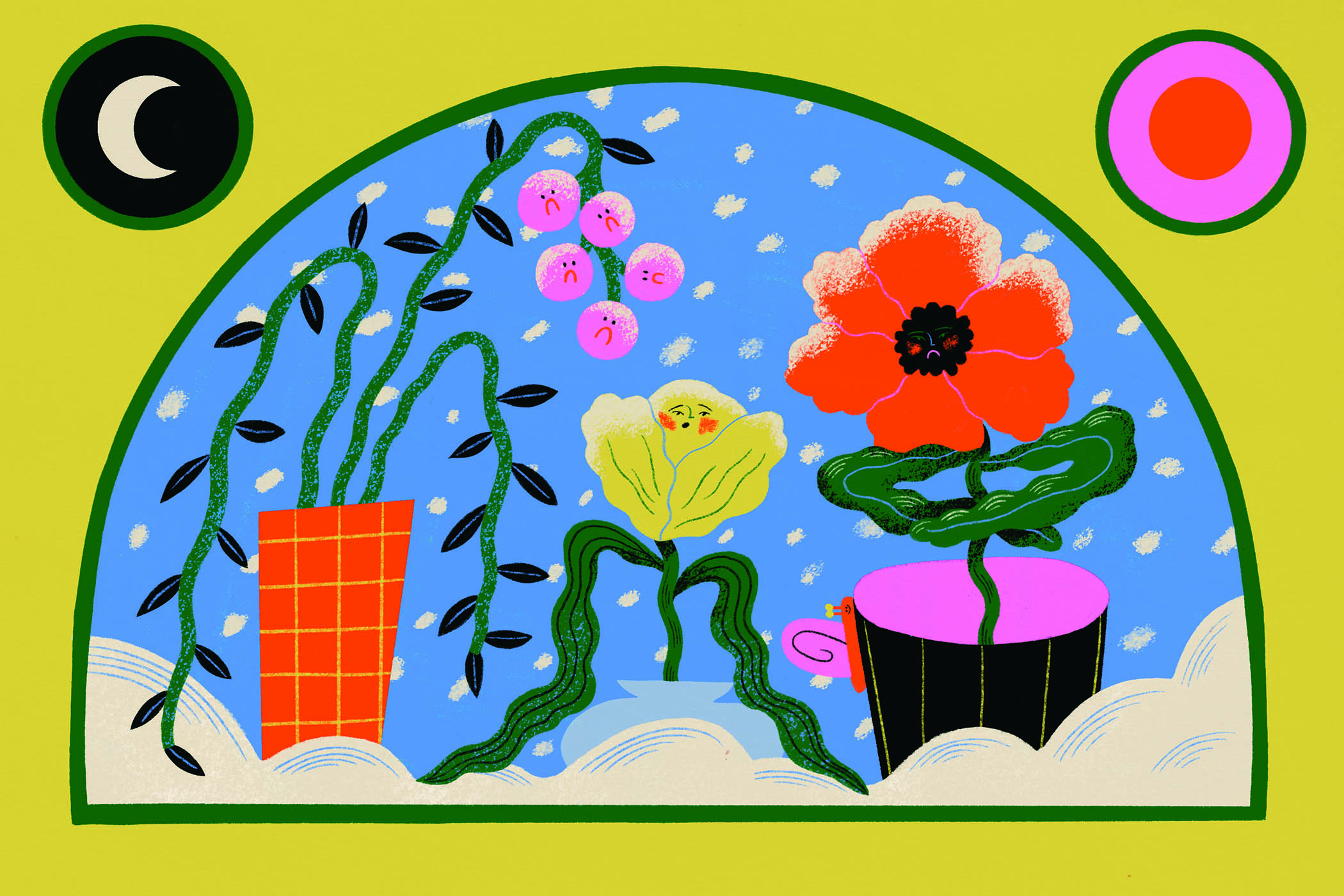Photograph by Manuel Vazquez
One day in the week after Vida’s diagnosis, we take the train down to Streatham, where my mum has made lunch. Walking through my parents’ front door, some of my tension uncoils as I am hit by the smells of home: quiche, dark wood furniture, a hoover full of dog hair. Frank, our elderly Staffie, waddles up to me, wagging his tail with his whole body and grunting; I’m sure he knows I’m not doing well – whenever I’m here, he sits loyally at my feet, looks for my hand and roots at the edge of it so I stroke his crown. I like Frank’s style of support. I’m heavily reliant on Mum and Dad’s support, too, but also irritated by their efforts to be positive. Recently, I have anticipated seeing Mum with a mixture of relief and trepidation.
Today, she has asked her friend Liz over. The two lived opposite one another in the 1980s, and Liz’s daughter Ellie – my oldest friend, now senior in NHS management, no less – was born 18 months prior to me. While ours was a home run by two journalists for whom good stories were everything, grey areas celebrated and multiple truths possible, Liz and her husband Paul have all the clear-sighted pragmatism of mathematicians. They came at things from another angle to my parents, and in this difference there was magnetism. When I arrive to find Liz there, I know what Mum is hoping for: a rhetoric that might help me see some light.
I can feel everyone’s fatigue, including my own, which seems, if not worse, then different to how it was in the weeks leading up to the diagnosis: Diamond Blackfan Anaemia Syndrome (DBAS), a life-limiting blood disorder in which a patient’s bone marrow doesn’t make enough red blood cells to sustain life. My husband, Freddie, and I had taken Vida in for a routine appointment at the local hospital two days shy of her reaching 12 weeks old; I will never forget the look on the consultant paediatrician’s face, her horror at my baby’s pallor. But, as new parents, we were overwhelmed by four months of poor feeding, weight loss and near constant crying (her), and many weeks of sleeplessness and self-doubt (me), which amounted to a growing sense that I was no good at this mothering thing. The diagnosis told a different story.
The author Anne Boyer wrote in The Undying that a diagnosis is “a specific name for a life splitting in two”. She was speaking as a patient, of course, but this is also my experience as a parent receiving a diagnosis on behalf of my child – hearing it was a watershed moment between the innocent before and the knowing after. Having DBAS means a life of close and regular medical monitoring. The first line of treatment is blood transfusions, one every three weeks to maintain a healthy haemoglobin level in the patient – so they can not just survive but thrive. Unless Vida responds to a course of high-dose steroids (which put a minority of patients into remission) or has a bone marrow transplant – a terrifyingly risky procedure – then these three-weekly blood transfusions, followed by an inevitable descent into anaemia, will be Vida’s fate.
The pressure to be a good mum makes me feel as though I am melting
The pressure to be a good mum makes me feel as though I am melting
I sit at the kitchen table, the stage for this particular maternal intervention. The air is thick with tension. Liz pulls up a chair. “I wanted to talk to you,” she says. Mum is hovering in the background, bobbing up and down with Vida in her arms. I am trying not to cry. I have known this woman my whole life, probably cried in front of her dozens of times as a child, but these days I seldom see her and I am suddenly aware of my shame. At the lump in my throat, the rising sting in my face, the quiver in my lip; shame at her having reason to talk to me in this way at all. This is new terrain – adult to adult. The dynamic has shifted and her message is simple: this might be hard, but I have a responsibility to Vida.
Liz reminds me that I can’t fall apart, that Vida is going to need a lot of support over the course of her life and that I have to be strong for her. She delivers this gently but firmly. I daren’t answer back, as I would if she were my mum. Petulance zipped in, I am forced to hear what I know is expected of me, the things that, said out loud, scare me so much. That I am an advocate for my daughter, no matter her treatment pathway; that I have a duty not only to educate myself about this condition, but to fight for her wellbeing at every juncture.
In her Neapolitan novels, Elena Ferrante writes about the character Lila’s “dissolving margins”. I had inhaled these books a few years back, but not truly known what she’d meant with this phrase until now. The pressure to be a good mother makes me feel as though I am melting; I can’t contain this sea of worry within the framework of myself. I am all liquid. Perverse as it is, I can summon the energy to push for the most extreme approach to treating Diamond Blackfan, a bone-marrow transplant, in which Vida’s bone marrow (or “blood factory”) would be wiped out by chemotherapy in order to make way for a donor’s healthy marrow, a process involving many months, sometimes even years, in a liminal state of isolation with a suppressed immune system. Not only this, but I am pursuing the gold standard of donors – a sibling; there is a one in four chance of a naturally conceived brother or sister being a match for Vida, so we have set out to engineer one through IVF, genetically testing any embryos made with bespoke probes.
Related articles:
But all the miniature degrees between here and there feel like a bigger feat: the advocating day-to-day for my vulnerable baby; the questioning of clinicians; pushing to make Vida’s every brush with hospital comfortable; the staying abreast of research; most importantly, to imbue her with a sense of her own magnificence, both in spite of and because of her medical challenges.
“I just don’t think I can do it, Liz,” I whisper.
Newsletters
Choose the newsletters you want to receive
View more
For information about how The Observer protects your data, read our Privacy Policy
“But she’s here…” she says, her eyes full as she gestures to Vida. Mum’s gaze is averted downwards, her lips pursed. I feel bounced into this conversation, at once wildly angry about it and grateful that the issue is being forced through a medium like Liz’s tough love. “And you’re already doing it,” she adds.
It’s not the first time someone has said this to me. The expectation to put my child’s wellbeing above my own can feel oppressive, but while I push against it, I also know that it’s what I do anyway.
Vida is taking a bottle at bedtime more happily now and drinks a good bellyful while we read books to her – among them, Mr Crum’s Potato Predicament, about the invention of potato chips, and Goodnight Moon, a weird American classic with an old rabbit lady in a rocking chair. These books will be the foundations on which her first words are built, a year or so from now.
Vida’s blood tests, transfusions and appointments have, for now, joined the other routine logistics of having a baby – nappy changes, feeds, bathtimes. Liz is right, I am already doing it. I am, as I’ve seen people say on Facebook, “a DBAS mum”.
Whenever we get home after a transfusion, I take a selfie of Vida on my lap, her little cheeks ruddy, her ears glowing and her lips bud-like once more. I, too, look less sallow than she did in her very early days, revived as I am by the fact of her feeling well. I shared my blood supply with this baby for nine months and now, it seems, she shares hers with me. Blood can symbolise so much of what it means to be alive, also to die. A person’s very essence. Belonging, family, loyalty. Pain, suffering, sacrifice. It is a fact we are blood relatives. Blood is thicker than water, goes the saying, and I don’t always agree, but I do know that the blood I share with Vida is thicker than anything I’ve ever known.
This is an edited extract from Lifeblood: A Mother in Search of Hope by Mina Holland, published by Daunt Books, £10.99



